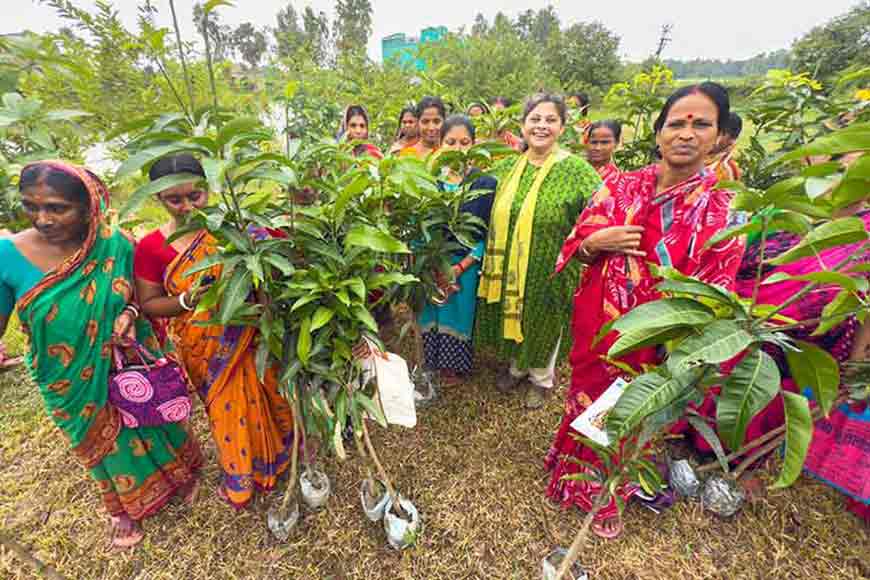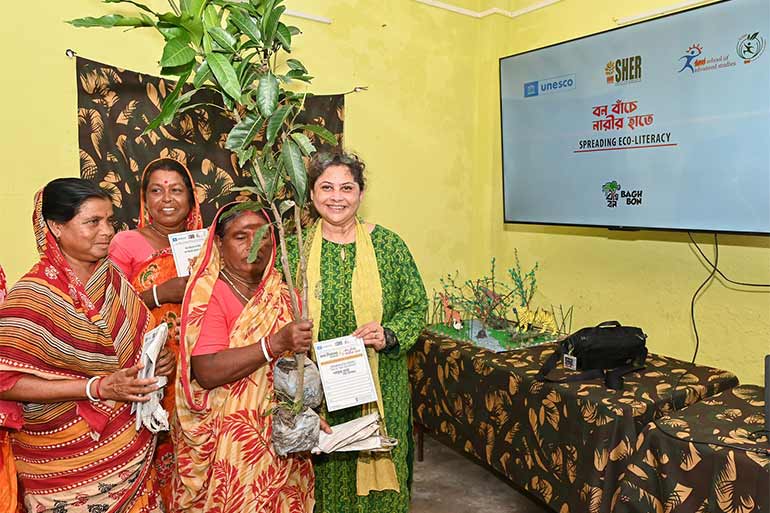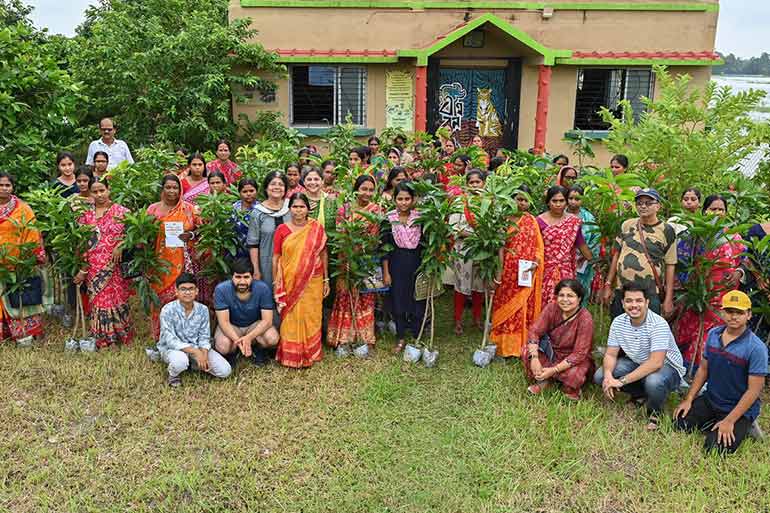“Bon banche, narir hatheâ€: Sundarbans women sow seeds of hope on World Tiger Day- GetBengal story

On World Tiger Day, 29th July 2025, an inspiring initiative was launched at Baghbon, located in the bird haven on the fringes of the Sundarbans Tiger Reserve, by SHER (Society for Heritage & Ecological Research) at their Community Resource and Knowledge Centre.
The core message of the initiative was, “Bon banche, narir hathe”(Forests survive through the hands of women).In other words, the forest’s future lies in women’s care and active participation. A tree means many lives, and when nurtured by a woman, that tree becomes a promise of a safer future, for both forests and tigers.
If tigers survive, forests survive. And if forests survive, so do rivers, water, and livelihoods. In fact, the tiger is the guardian of the Sundarbans’ biodiversity, the world’s only mangrove forest where tigers naturally live. As part of this awareness campaign, titled “Bon Banche,narir hathe”, 50 marginalised women living near the forest were each given two mango saplings. Not as gifts, but as a promise to strengthen their bond with the future of the forest and the tiger.

The women of the Sundarbans are not confined to household chores alone. Soil, water, and trees are integral part of their daily lives. This event explored how these women — from within their own villages — can contribute to the conservation of mangroves and tigers. They were encouraged to protect nearby plants, animals, and birds, become active participants in wildlife and nature conservation, and spread awareness in their families, neighbourhoods, and communities. For instance, if any wild animal is spotted in the village, the Forest Department should be informed instead of reacting with panic. Above all, the goal is to reduce dependency on forest resources.
The initiative does not claim that planting a few mango trees will magically end human-tiger conflict or instantly restore dense forest. Rather, the saplings represent a long-term relationship between women, nature, and wildlife. The fruit from those trees will one day feed their children and families with both environmental and emotional connection.
One of the most significant aspects of the event was the focus on pollinators — bees, butterflies, birds, and insects — the unsung heroes of ecological health. As the mango trees bloom flowers, they will attract pollinators who aid in the regeneration of both forests and agricultural fields. In this age of climate crisis, the role of pollinators in environmental balance and forest conservation is critical.
Suchandra Kundu, a member of SHER, explained to the women present at the discussion session the importance of the environment and pollinators in forest conservation, the harmful effects of chemical fertilizers and pesticides, and the silent yet significant leadership of women in protecting the environment.
The growing concerns over the use of chemical fertilizers and pesticides , which are causing a decline in pollinator populations, were also discussed. It must be remembered that without pollinators, the entire food web and ecosystem could collapse. This would affect crop production, natural forest regeneration, and the ecological balance that is intricately linked to the existence of apex predators like tigers, ultimately impacting their survival as well.
Through storytelling, audio-visual presentations, and participatory discussions, the participating women came to understand how even a simple mango tree is connected to a vast natural chain. Tree → pollinating insects → forest → deer → tiger — in this life cycle, the mango tree planted in the courtyard of those women also plays a role.

This initiative is a powerful reminder that tiger conservation doesn’t begin with high-level policy, but with the everyday lives of the women who live in forest-fringe communities — and who can become grassroots champions of the Sundarbans’ ecosystem.
Each woman was also given a Tree Journal, a small, easy-to-read diary in Bengali, to record the growth of their saplings, pollinator activity, flowering events, and small changes in the surrounding environment.
A year from now, on World Tiger Day 2026, these journals will be reviewed to assess which participant took the best care of her trees and the life it nurtures. Based on this, recognition and awards will be given.
SHER believes:
When a woman plants a tree, she nurtures not just fruits or shade — she saves forests, tigers, and the future.
So this World Tiger Day, the women of the Sundarbans joined SHER in raising their voices:
“If the tiger survives, the Sundarbans survive; if the Sundarbans survive, we survive!”
Note : Translated by Debamita Ghosh Sarkar
To read the original Bengal article, please click here :










